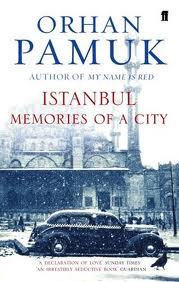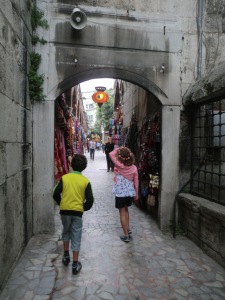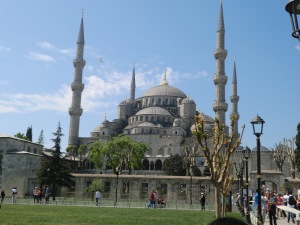 Although I carried the book to Istanbul and back, there was no inclination to read it while I was there, I started it on the return plane journey, the appropriate occasion to do so, for Pamuk’s Istanbul is laced with more melancholy than the city I visited and I realise with hindsight, the importance of constructing my own unfettered impressions, free of this philosophical consequence of the decline of a grand empire and the inclination of its progeny to feel somewhat bereft at missing out on an era when their prominence was that much greater than it is today.
Although I carried the book to Istanbul and back, there was no inclination to read it while I was there, I started it on the return plane journey, the appropriate occasion to do so, for Pamuk’s Istanbul is laced with more melancholy than the city I visited and I realise with hindsight, the importance of constructing my own unfettered impressions, free of this philosophical consequence of the decline of a grand empire and the inclination of its progeny to feel somewhat bereft at missing out on an era when their prominence was that much greater than it is today.
However, I remain as intrigued about the author now as I did before I started the book, it is a unique form of memoir, more of a nostalgia trip through selective memories of his childhood and his city, sharing anecdotes from both that formed him into the writer he is today.
The imagination features large in Pamuk’s life from a very young age, when he was five-years-old he was sent to stay with an Aunt on his own and she used to point at a picture of a child and say it was him. He came to know him as the other Orhan and while he knew it was not him, this shadow of himself never left him behind. Neither did he ever leave the city of Istanbul in the fifty years up to writing this book.
“But the ghost of the other Orhan in another house somewhere in Istanbul never left me. Throughout my childhood and well into adolescence, he haunted my thoughts.”
Though he never left the city, he read many works by writers and poets who published impressions of Istanbul, Gustave Flaubert, the poet Gérard de Nerval, Théophile Gautier, Pierre Loti, Edmondo de Amici and laments that in the same period they were writing about the city, little was written or painted by its own artists and writers, therefore, whilst the work of others is familiar, it remains an outsiders perspective and does not quite capture the essence of how the Istanbullus see themselves.
Pamuk often visualises the city in black and white and throughout the book on nearly every page are photographs depicting the city in monochrome. He spends an entire chapter describing Hüzün, the Turkish word for melancholy explaining how if differs from sadness and finishes by almost convincing the reader that it is something close to a virtue, absorbed with pride and shared by a community.
“the hüzün of Istanbul is not just the mood evoked by its music and its poetry, it is a way of looking at life that implicates us all, not only a spiritual state, but a state of mind that is ultimately as life affirming as it is negating.”
“… hüzün brings us comfort, softening the view like the condensation on a window when a tea kettle has been spouting steam on a winter’s day.”
I did not come to Istanbul expecting to see sultans, dervishes or crystal chandeliers, though there are traces of them all if you seek them out. I came to see a city that comfortably exists while straddling two sides of a significant divide.
The Bosphorus, that deep channel of powerful surging water and current that separates two continents is deceiving. The reasonably short distance from one side to the other, only 2 to 3 kilometres, the fact that it embraces one city reminds us that there is less than we might think between the people who inhabit each continent.
A deep and powerful separation of continents, yet humanity passes across it with ease. Great divides can indeed be overcome. The streets of shops and the Grand Bazaar attest to that passage of traders and pilgrims who have entered and passed through the city over hundreds of years.
It takes until the very last chapter before we meet the more mature Orhan who will become a writer, because unlike many born to write, his first love was painting and he shares much through his observation and study of artists who painted his city, something he practiced prolifically in his youth. The demise of this early calling occurred not long after his teenage muse was packed off by her family to Switzerland, his mother’s relentless cautions against pursuing the life of an artist transforming his rebellion against completing his architectural studies into announcing:
“I don’t want to be an artist.” I said. “I am going to be a writer.”
“I was, as I had begun to discover even then, the sort who could always wear the same clothes and eat the same things and go for a hundred years without getting bored so long as I could entertain wild dreams in the privacy of my imagination.”
A treat for admirers of Orhan Pamuk’s work and those who have had the good fortune to visit his wonderful city, which is not nearly as melancholic to the visitor as it is to a philosophical resident.
Next up, murder at an archaeological dig! Time to leave Istanbul and travel inland with Ahmet Umit.




Thank you for your insights into Pamuk’s works. Knowing about the impact of his imagination from such a young age, and his desire to be an artist, added to my appreciation of “My Name Is Red,” which I loved.
LikeLike
Yes, I am thinking back to My Name is Red now and realising the connections between Pamuk’s own interests in the miniaturists and the story, a whole interesting subject in itself. It is no wonder he pursued a story about art and one that went back in historical time, fascinating indeed.
LikeLike
It sounds like this book should be enjoyed like Turkish Delight, packaged, eaten in small cubes and dusted with melancholy and memoires.
LikeLike
Definitely! Accompanied by apple tea in small glasses.
LikeLike
I will have to buy this one! I read Snow and although it was a new type of fiction for me, I enjoyed its twists and turns, its political background and of course, its cultures.
LikeLike
Having read this book, I completely understand why Pamuk has opened his own museum, sadly I didn’t get there on this trip, travelling with a 10 and 11 year old requires some compromise, but the book as well has many wonderful, evocative photographs.
I have read 3 of his novels and none of them were anything like the previous work, I find him to be quite diverse and almost unpredictable, and then I thought this memoir might give me a clue, but really it just tempts us to want to know more.
LikeLike
Ooh, I love Istanbul and this has been a book I’ve been meaning to read. Like you, I’ll have to bring it on a return there. And with all the excitement of that fascinating city, like you, I may not even crack it open. : ) Great post.
LikeLike
It is indeed a wonderful travel companion whether its pages get opened or not, there is something reassuring just in knowing it is there and certainly for me the return journey was the perfect time to start it.
LikeLike
what an evocative review — of the book, the city, and the imagination!
LikeLike
Beautiful review, Clare! I loved the passage in which Pamuk explains the word ‘hüzün‘. When I read your comment on what Pamuk says that while writers and artists from other countries wrote about Istanbul, Turkish writers didn’t write or paint much during that period. It is an interesting thing that many times when writers, artists and history enthusiasts write about a city or paint images of it or visit places in it, the residents of the city just live their normal everyday lives. It sounds so odd when we look at a city as outsiders and we wonder why the residents don’t appreciate their history or culture or the beauty of their city better or create works of art which reflect the beauty of their city. But then when we live in our own city, we do the same things – we just live our everyday lives.
I remember during my childhood, I lived in a city which had a very huge and famous temple in the middle of the city and when my uncle visited us he always went to the temple. But as a local, for me and my friends the temple was a structure which was always there and which was part of the city and our lives and we had got used to it, and we just went about our everyday tasks. Now, having moved away from there, I smile at what I thought then.
Thanks for this beautiful review, Clare. I want to read ‘Istanbul‘ sometime.
LikeLike
It must have been so interesting to read this on the flight home- your own fresh nostalgia (if nostalgia can ever be ‘fresh’) and Pamuk’s narrative. I love his writing but haven’t read ‘Istanbul’ yet – I look forward to reading it now more than ever.
LikeLike
Pamuk, another I have not read but you bring his work to life with vibrancy, roll on pay day….
LikeLike
Another deeply appreciated review! I devour books about a destination prior to visiting but your comment about establishing your own thoughts and memories before reading this book made good sense. I liked that! Pamuk’s description of hüzün made me think of the Fado singers of Portugal and the heartfelt saudade/melancholy they express in their heartfelt deliveries. Would you say it is similar?
How lovely you shared this travel with your children and their grandparents. Multi-generational memories! ❤
LikeLike
Yes Patricia, I think the Fado singers depict well that long lost feeling that hüzün suggests. I too love to read before arriving at a destination, but it’s almost the one activity that suffers in the preparations.
I do remember that by the time I arrived in Vietnam for example, I had time to buy a couple of books by local authors and then read then while I was there. That, I think is the perfect solution, experiencing the country by day, reading it’s stories by night.
I have a feeling this is just the beginning of travel adventures with the children and grandparents.
LikeLike
After reading your thoughts on Pamuk (and Istanbul), I couldn’t resist pulling my copy of ‘Snow’ from the shelf — to remind myself of why it left such an imprint. Can’t think of him without also recalling his wonderful Nobel speech, “My Father’s Suitcase,” which appeared in the New Yorker. He’s definitely a writer whose work I want/need to read more of. ‘The Museum of Innocence” has me particularly intrigued. I’m sure I’ll get around to the memoir one day as well. Sounds like a fascinating trip for you, on many levels.
LikeLike
I haven’t read that speech, I shall have to track it down. He is very diverse in the subjects he tackles and with The Museum of Innocence he doesn’t just write the metaphor, he makes you almost experience it, testing the readers endurance. The actual museum he has created I really wish to see one day and am sure I will, his memoir could have been titled a Musuem of Innocence as well!
LikeLike
Pingback: Patasana: Murder at an Archaeological Dig | Word by Word
a very deep review you have. I really wish I can go visiting Istanbul myself 🙂
LikeLike
Put it on your list of cities to visit, I am sure you will love it.
LikeLike
I laughed when I read this post as I was actually in my hotel in Istanbul with this book untouched on my bedside table! I was way too busy rushing round exploring this intriguing city. Now back home, I am loving the Portrait of a Turkish Family which you recommended and then will tuck into Pamuk. thank you so much for the ideas!
LikeLike
A book that I have longed to read forever. Perhaps when I finally book that ticket to Istanbul I will be obliged to read it before I embark on journey there. 😉
LikeLike
Pingback: Portrait of a Turkish Family | Word by Word
I loved this book too Claire … I read it before I started blogging so haven’t written on it but it’s a book that stays with you isn’t it. The chapter on Hüzün was wonderful.
LikeLike
Very special indeed, one deemed to become a classic like Irfan Orga’s Portrait of a Turkish Family I am sure.
LikeLike
Oh, I don’t know that one … Will keep it in mind. I think Pamuk is the only Turkish writer I’ve read.
LikeLike
I’ve just had a Turkish literature binge after spending a week in Istanbul and a bookshop owner there put me onto Orga’s classic.
I was already a fan of Elif Shafak’s work, which you may be interested in as well, her work is more contemporary, she is an excellent storyteller. Her last book Honourwas shortlisted for the Women’s Prize for Fiction (previously the Orange Prize)
LikeLike
Thanks Claire … yes I know the Orange/Women’s Fiction Prize but must admit I didn’t look much at the shortlist this year. I’m not keeping up with my reading very well at present! But I might suggest it for my reading group as a couple have just been to Turkey. That would be a good way of getting to read it!
LikeLike
Sorry I meant the longlist, not the shortlist. a good one for a reading group for sure.
LikeLike
That’s ok … I wondered but didn’t check. Have added it to my reading group folder.
LikeLike
Pingback: The Other Side of the Mountain by Erendiz Atasü tr. Elizabeth Maslen #WITMonth – Word by Word
Pingback: Portrait of a Turkish Family by Irfan Orga – Word by Word